Kris
Kristofferson

-
Inducted2004
-
Born
June 22, 1936
-
Died
September 28, 2024
-
Birthplace
Brownsville, Texas
Kris Kristofferson 1936 – 2024
—Kyle Young, CEO
Country Music Hall of Fame and Museum

From Soldier to Songwriter
In some ways, Kris Kristofferson was an unlikely candidate for a career as a country songwriter and recording artist. Considering his family background and his education, he seemed destined to become a military officer or a college professor.
Kristofferson was the son of an Air Force major general, and he served as a captain and helicopter pilot in the U.S. Army during his own stint in the service. As a Rhodes Scholar, he studied literature at Oxford University after finishing his undergraduate degree at Pomona College in California.
Two weeks before Kristofferson was to begin teaching English literature at West Point, however, he resigned his commission and headed for Nashville, where he pursued his dream of becoming a professional songwriter. He found encouragement from publisher Marijohn Wilkin at Buckhorn Music early on, and later from Fred Foster and Bob Beckham at Combine Music. Like most Nashville tunesmiths, he paid his dues working part-time jobs, including that of janitor for Columbia Studios. While Bob Dylan was recording his famous Blonde on Blonde album there, a then-unknown Kristofferson was sweeping floors and emptying ashtrays.
Songs
00:00 / 00:00
00:00 / 00:00
00:00 / 00:00
00:00 / 00:00
Success as a Songwriter
All the while, Kristofferson was crafting a songwriting style that drew inspiration from the Romantic poets, from the folksingers and poets of New York’s Greenwich Village, and from Mickey Newbury, a fellow Texan and close friend, who also was a Nashville-based songwriter. Kristofferson’s songs began to embody not only the alienation that many Americans felt in a turbulent era of social change, but also the high value they placed upon personal freedom, emotional honesty, and sexual frankness. As a result, his songs helped country artists speak to the times and win new fans young and old alike.
Roger Miller, for instance, recorded Kristofferson’s “Me and Bobby McGee,” gaining a #12 country hit in 1969. The following year, Ray Price took Kristofferson’s “For the Good Times” to the top of the country charts and crossed over to the pop charts, peaking at #11. Also in 1970, Bobby Bare cracked the country Top Ten with Kristofferson’s “Come Sundown.”
One of Kristofferson’s musical heroes was Johnny Cash, who inspired Kristofferson’s song “The Pilgrim.” After several unsuccessful attempts to pitch Cash the song “Sunday Morning Coming Down,” Kristofferson finally got his attention by piloting a helicopter and landing it in Cash’s backyard. The song became a #1 country hit for Cash and the Country Music Association’s 1970 Song of the Year.
The year 1971 proved even more successful for Kristofferson. Sammi Smith’s rendition of his “Help Me Make It Through the Night,” in which the narrator openly encourages a one-night stand, topped the charts that year, winning Kristofferson a Grammy for Best Country Song. Additionally, Smith’s recording won a Grammy for Best Country Vocal Performance, Female, and a CMA for Single of the Year. Also in 1971, a recording of “Me and Bobby McGee” by rock star Janis Joplin became a #1 pop hit.
Inspired by Kristofferson’s literary, sensual approach, other writers followed in his footsteps. “Hearing Kristofferson’s ‘Me and Bobby McGee’ on the radio and knowing it came out of Nashville made Nashville seem a lot more accessible to me,” said Guy Clark, renowned for songs including “L. A. Freeway” and “Desperadoes Waiting for a Train” about his own 1971 move from Los Angeles to Nashville.
Videos
“Jody and the Kid”
“Sunday Morning Coming Down”
Image Gallery
-
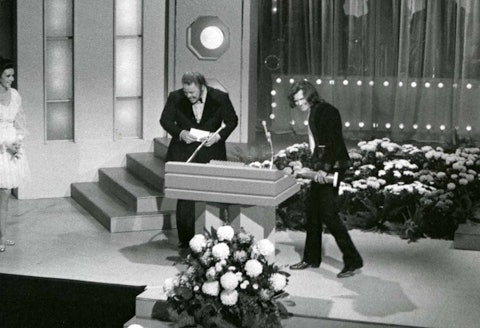
Kris Kristofferson, onstage with Roy Clark, receiving the Song of the Year trophy for “Sunday Morning Coming Down” at the 1970 Country Music Association Awards.
-
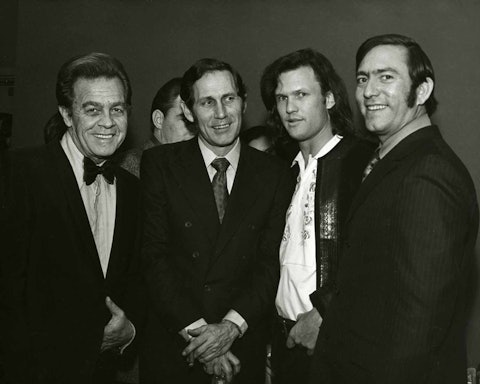
From left: Eddie Miller, Chet Atkins, Kris Kristofferson, and Mac Powell, 1971 . Photo by Ray Russell.
-
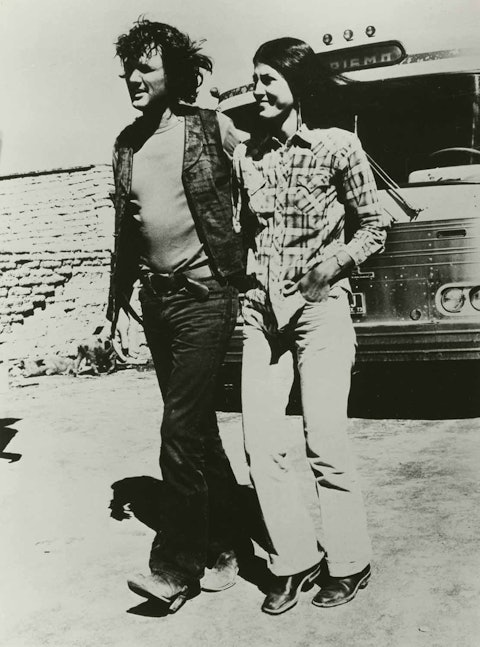
Kris Kristofferson and wife Rita Coolidge, 1975.
-
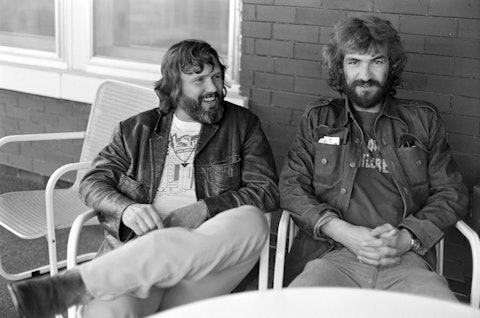
Kris Kristofferson and bandmate Donnie Fritts, 1975. Photograph by Raeanne Rubenstein.
-
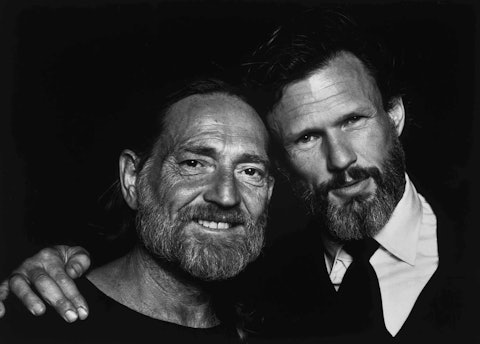
Willie Nelson and Kris Kristofferson in a promotional photo for the film Songwriter, 1984. Photo by Walden S. Fabry Studios.
-
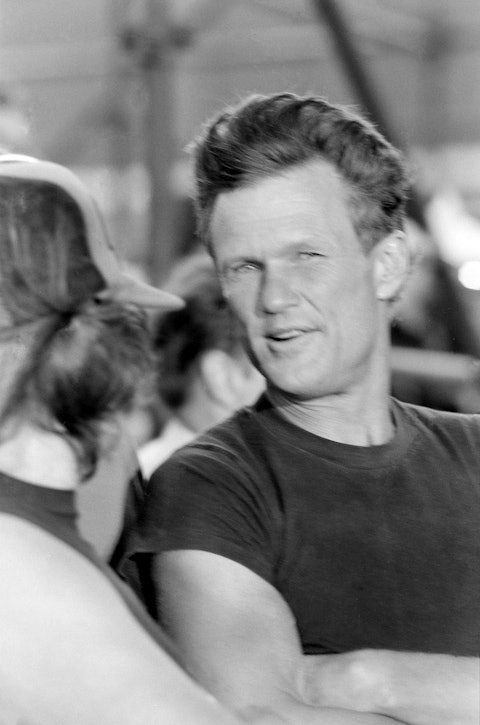
Kris Kristofferson at the Farm Aid concert in Champaign, Illinois, 1985. Photograph by Raeanne Rubenstein.
Becoming a Hit Recording Artist
As the decade progressed, Kristofferson continued to find the mark with songs such as “Please Don’t Tell Me How the Story Ends,” a #1 hit for Ronnie Milsap in 1974. Moreover, Kristofferson began to make his own hit recordings of his original material for Fred Foster’s Monument Records, including the #29 pop record “Loving Her Was Easier (Than Anything I’ll Ever Do Again)” and the gospel-influenced “Why Me,” a crossover hit of 1973 that was Kristofferson’s only country chart-topper as a recording artist.
With Rita Coolidge, to whom he was married from 1973 to 1980, Kristofferson made several duet albums and won two Grammys for Best Country Vocal Performance by a Duo or Group. The first came in 1973, for their recording of “From the Bottle to the Bottom,” and the second in 1975, for their rendition of the 1962 Clyde McPhatter R&B hit “Lover Please.”
Long a popular stage performer, Kristofferson hit again on disc with “Highwayman” (1985). The remarkable song was penned by Jimmy Webb and recorded by the superstar group the Highwaymen, which included Kristofferson, Johnny Cash, Waylon Jennings, and Willie Nelson.
“Hearing Kristofferson’s ‘Me and Bobby McGee’ on the radio and knowing it came out of Nashville made Nashville seem a lot more accessible to me.”
– Guy Clark
Finding Hollywood Movie Star
In addition to his many songs and recordings, Kristofferson has acted in dozens of films and made-for-television movies, including Pat Garrett and Billy the Kid (1973), Alice Doesn’t Live Here Anymore (1974), and Songwriter (1984), in which he teamed with fellow legend Willie Nelson. For the latter film, he received an Oscar nomination for Original Song Score. In 1976, he starred in a remake of A Star is Born alongside Barbra Streisand; his performance won him the Golden Globe award for Best Actor – Motion Picture Musical or Comedy.
Now one of American music’s most respected artists, Kristofferson continues to act, write songs, record, and make occasional tours. He is an activist who speaks out on social justice and human rights issues, and the American Veteran Awards named him Veteran of the Year in 2002.
—Jack Bernhardt
Adapted from the Country Music Hall of Fame® and Museum’s Encyclopedia of Country Music, published by Oxford University Press



